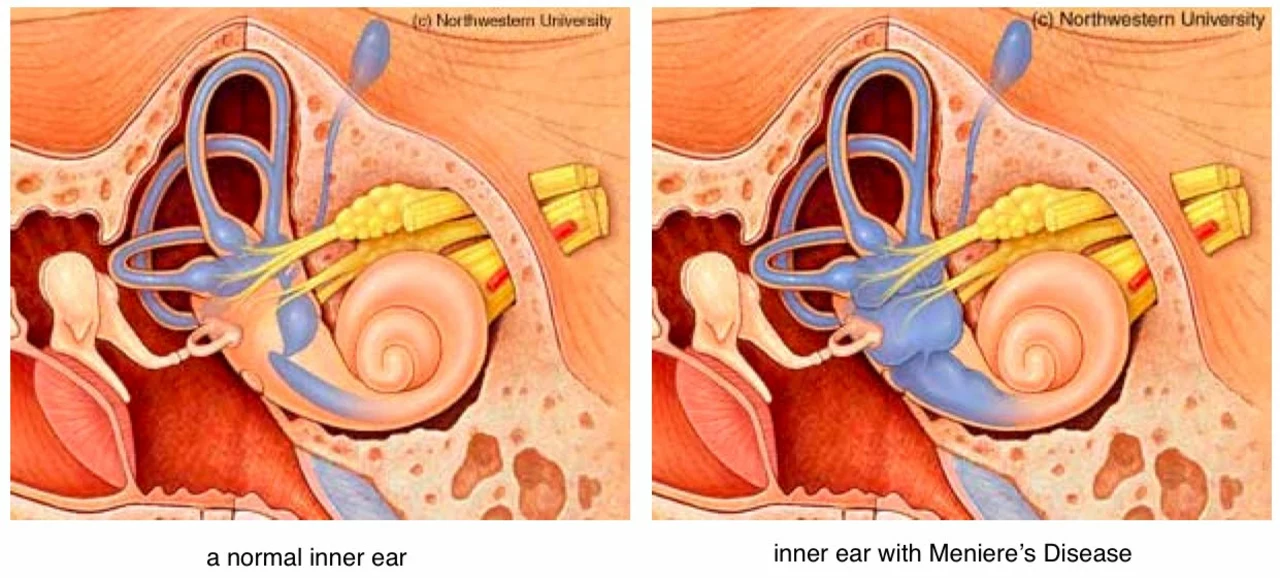Meniere's Disease Symptoms, Causes & Treatment Guide
If you’ve ever felt a sudden wave of spinning dizziness that lasts minutes to hours, you might have experienced a Meniere’s attack. It’s an inner‑ear condition that messes with your balance and hearing, often striking adults in their 40s or 50s.
Typical signs include fluctuating low‑frequency hearing loss, roaring tinnitus, a full feeling in the ear, and episodic vertigo. The attacks can be unpredictable – one day you’re fine, the next you’re stuck on the floor.
How Doctors Figure It Out
There’s no single lab test for Meniere’s, so doctors rely on your history and a few key exams. An audiogram will show low‑tone hearing loss that comes and goes. Balance tests like videonystagmography (VNG) or the caloric test help confirm inner‑ear involvement.
Doctors also rule out other causes of vertigo, such as vestibular migraine or ear infections, before confirming Meniere’s disease.
Everyday Ways to Calm the Storm
Diet tweaks are a first line of defense. Cutting back on salt, caffeine, and alcohol can reduce fluid buildup in the inner ear. Some people find relief with a low‑sodium diet (under 1500 mg per day).
Stress management matters too. Deep breathing, yoga, or short walks can keep your nervous system from firing up during an attack.
If lifestyle changes aren’t enough, medication can help. Anti‑emetics like meclizine ease nausea, while diuretics such as hydrochlorothiazide lower inner‑ear fluid pressure.
For stubborn cases, doctors may suggest more intensive options: steroid injections into the middle ear, intratympanic gentamicin to reduce vertigo, or even surgery (e.g., endolymphatic sac decompression).
Physical therapy designed for vestibular disorders—called vestibular rehabilitation—teaches your brain to rely less on the damaged ear and more on visual cues.
Hearing aids are useful when hearing loss becomes permanent. They amplify soft sounds without worsening balance issues.
Finally, keep a symptom diary. Jot down what you ate, stress levels, and how long each attack lasted. Patterns often emerge, making it easier to tweak triggers.
Meniere’s disease can feel scary, but most people learn to control it with the right mix of diet, meds, and therapy. If you suspect you have it, schedule an appointment with an ENT or audiologist—they’ll guide you through diagnosis and a personalized plan.
Can betahistine help with symptoms of Meniere's disease in children?
In a recent blog post, I discussed the potential benefits of betahistine in treating symptoms of Meniere's disease in children. Meniere's disease is a disorder that affects the inner ear, causing symptoms like vertigo, hearing loss, and tinnitus. Some studies have suggested that betahistine, a medication commonly used to treat vertigo, may also help alleviate these symptoms in children suffering from Meniere's disease. However, more research is needed to confirm the efficacy and safety of betahistine for pediatric use. It's crucial for parents and healthcare providers to stay informed about the latest treatment options and continue exploring ways to improve the quality of life for children affected by this challenging condition.






